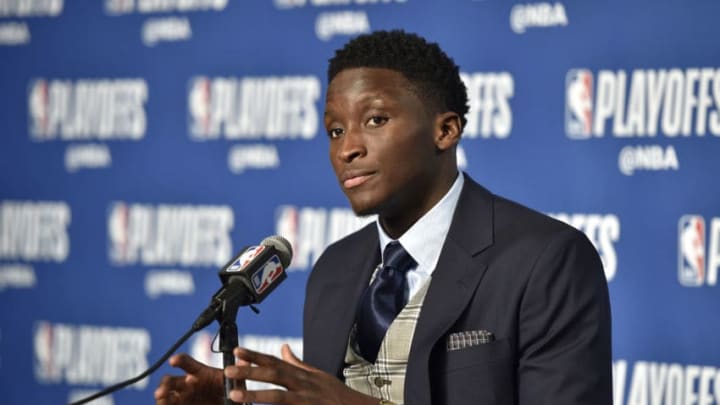The NBA meant to reward big stars who stayed home with its designated veteran player exception, but in practice has forced them out.
Quibbling about a clause that will only affect a small percentage of NBA players in the current collective bargaining agreement may seem unnecessary, but when it comes to the designated veteran player exception (DVPE) the worry is worthwhile.
The DVPE is a way for a team to give a legitimate star player more money earlier in their career. Players coming off of their second contracts are typically only eligible for contracts starting at 30 percent of the salary cap in the first year of the new deal.
When those players sign the DVPE, they can make between 30-35 percent of the cap in the first year of the new deal, which has to be for a full five seasons. That’s a serious boost, considering max raises between seasons keep on adding value to a deal.
There’s a catch to these exceptions: they can only be signed by players who have won Defensive Player of the Year or MVP, or been named to an All-NBA team, over the last three seasons. (Technically they can have made an All-NBA team or been named DPOY in either the most recent season or both of the ones before or, or won MVP at any point over that span.)
That’s a tough qualification, which leaves a lot to the media voters who pick those teams, but it makes sense (from the perspective of the owners, at least) to have some limit on how many players are eligible for such a huge deal. The other bit of fine print is a little less fair. Only players on the team that drafted them, or that were traded before the end of their rookie contract, are eligible.
The point of that clause was meant to encourage stars to stay in the markets that drafted them. The NBA is and has always been concerned with keeping small markets viable in the championship picture. This was meant to be a way to keep those players with those teams.
Instead, its become a boogeyman that has led to more stars being traded than ever before. Jimmy Butler and DeMarcus Cousins both were dealt at least in part due to their franchises not being sold on them as guys worth the entirety they were eligible to make.
The intention of limiting player movement is troubling on its own, but the way its been introduced in the DVPE gives power wholly to the teams. Why should a player who may well be very loyal to their first team get financially punished because they were traded out of the blue?
Victor Oladipo is a good example of a player who did nothing to show he wasn’t planning on sticking around with his first team. Oladipo was dealt by the Orlando Magic and then again by the Oklahoma City Thunder. If he keeps up the level of play he demonstrated last season, he’d probably be eligible for the DVPE after his current deal expires.
Except he isn’t, because he was dealt. Oladipo didn’t demand a trade, or try and sit out. He just happened to be traded a few times, so now his earning potential is severely limited. That’s not right, and the NBA should do its best to make it right.
#Content you can’t miss
A German Swiss army knife; Sebastian Pycior explains how Dennis Schroder is the latest versatile offensive role player in a long line of them in OKC
Nowhere to go but up; Jonathan Roberts has three goals for the Sacramento Kings in 2018-19
Who will it be; An ESPN panel votes on who will be the 2018-19 Eastern, Western, and NBA champions
Doing it for his home; Ernice Gilbert recaps Tim Duncan playing basketball for a good cause in the Virgin Islands
Just wholly overlooked; Aymin Bakr lists the four most underrated players in Clippers franchise history
